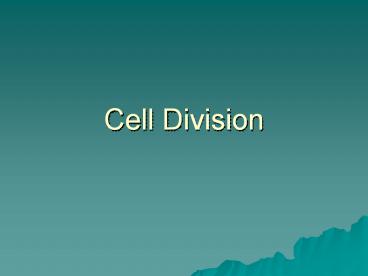Cell Division PowerPoint PPT Presentation
Title: Cell Division
1
Cell Division
2
Chromosomes
- Are made of DNA
- Each chromosome consists of sister chromatids
attached at a centromere
3
Cell Cycle
- During the cell cycle, a cell grows, prepares for
division, and divides to form 2 daughter cells,
each with each of which then begins the cycle
again. - Interphase time for growth and regular cell
activity. - Most of a cells life is spent in Interphase.
4
Interphase
5
Introduction to Cell Division
6
Mitosis
- The division of somatic or regular cells.
- Its divided into 4 phases.
- Remember Interphase is NOT part of Mitosis.
7
Introduction to Mitosis
8
Prophase
- First stage of Mitosis
- Chromatin condenses into chromosomes
- Centrioles separate and a spindle fiber begins to
form. - Nuclear membrane breaks down
9
Prophase
10
Metaphase
- Second Phase of Mitosis
- Chromosomes line up in the middle of the cell.
- Each chromosome is connected to a spindle fiber.
11
Metaphase
12
Anaphase
- Third Phase of Mitosis
- The sister chromatids separate into individual
chromosomes and move apart to opposite ends of
the cell.
13
Anaphase
14
Telophase
- Fourth and Final Stage of Mitosis
- Chromosomes gather at opposite ends of the cell
and lose their distinct shapes - Two new nuclear membranes have formed.
15
Telophase
16
Cytokinesis
- The cytoplasm pinches in half.
- Each daughter cell has an identical set of
duplicate chromosomes
17
Regulating the Cycle
- A protein call cyclin helps regulate the cell
cycle in eukaryotic cells. - They respond to internal and external events.
These proteins are regulators.
18
When Things Go Wrong
- Cancer cells do not respond to the signals that
regulate the growth of most cells. - As a result, they form masses of cells called
tumors that can damage surrounding tissues.
19
Cancer
PowerShow.com is a leading presentation sharing website. It has millions of presentations already uploaded and available with 1,000s more being uploaded by its users every day. Whatever your area of interest, here you’ll be able to find and view presentations you’ll love and possibly download. And, best of all, it is completely free and easy to use.
You might even have a presentation you’d like to share with others. If so, just upload it to PowerShow.com. We’ll convert it to an HTML5 slideshow that includes all the media types you’ve already added: audio, video, music, pictures, animations and transition effects. Then you can share it with your target audience as well as PowerShow.com’s millions of monthly visitors. And, again, it’s all free.
About the Developers
PowerShow.com is brought to you by CrystalGraphics, the award-winning developer and market-leading publisher of rich-media enhancement products for presentations. Our product offerings include millions of PowerPoint templates, diagrams, animated 3D characters and more.

